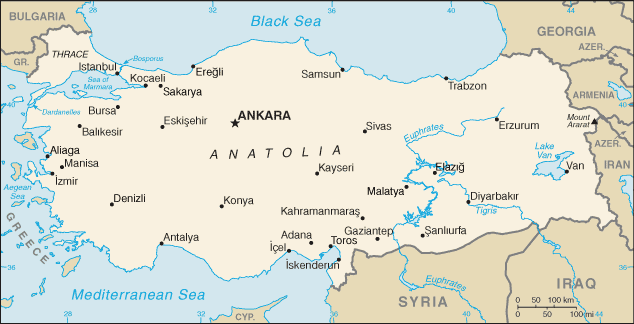 Security forces in southeastern Turkey, where authorities have been waging a brutal counterinsurgency war against Kurdish guerillas, reported the seizure last week of 2,290 kilograms of hashish and 6,632 kilograms of unprocessed cannabis "in an operation against the drug activities of the PKK terrorist organization."
Security forces in southeastern Turkey, where authorities have been waging a brutal counterinsurgency war against Kurdish guerillas, reported the seizure last week of 2,290 kilograms of hashish and 6,632 kilograms of unprocessed cannabis "in an operation against the drug activities of the PKK terrorist organization."
The operation took place June 8 in five villages of conflicted Diyarbakır province, with seven suspects taken into custody. Authorities said hundreds of local residents were questioned at checkpoints established across the area. This led to the location of what were described as two "safe houses" and one cave used by the Kurdistan Workers Party (PKK) guerillas, where the hash and pot was found along with rifles, ammunition, homemade explosives, supplies and PKK documents.
According to a June 9 account from Turkey's Daily Sabah: "Reported testimony from a terrorist captured by security forces yesterday indicated that the PKK's cannabis growing enterprise was a large source of income for the organization..."
This is an ominous sign that Turkey could be retuning to the bad old days. Hashish and heroin proceeds were reportedly used by both sides in the long war between the PKK and Turkish state that reached a bloody peak in the 1990s. But then, the element most notoriously mired in the dope trade was the Grey Wolves, a right-wing paramilitary network that the government used for "disappearances" of suspected guerilla collaborators and other such under-the-table dirty tricks.
According to a profile on Global Security, the Grey Wolves were "financed by heroin trafficking," with the protection of "high-level figures within the Turkish government." Although the Grey Wolves went into abeyance after exposure of their unsavory activities, elements linked to the network survive on Turkey's political right.
The war in Turkey's east finally seemed to be over when the PKK announced a ceasefire in 2013, in exchange for government guarantees of greater cultural rights for the Kurdish people. But the ceasefire broke down in 2015, opening up a new cycle of guerilla attacks and government counter-insurgency operations.
The Diyarbakır busts come just as the European Monitoring Centre for Drugs and Drug Addiction has released its latest annual report (PDF), finding: "In recent years, Turkey has been reporting larger quantities of herbal cannabis seized than any other European country." Of course most of these seizures are presumably in Turkey's east (technically in Asia Minor, not Europe), and it is unclear from the report if the sezied cannabis was grown within Turkey or being transported from points east toward European markets.
In any case, illegal drugs could once again prove both a goad of war and a pretext for repression, unless both sides can be brought back to the negotiating table and Turkey pressured to finally follow through on its pledges of greater language and cultural rights for Kurds. Of course, a more tolerant drug policy, especially where cannabis is concerned, wouldn't hurt either.
Cross-post to High Times
Graphic: Perry-Castañeda Library Map Collection







Recent comments
5 weeks 7 hours ago
5 weeks 13 hours ago
8 weeks 1 day ago
9 weeks 13 hours ago
13 weeks 20 hours ago
16 weeks 6 days ago
20 weeks 6 days ago
21 weeks 4 days ago
31 weeks 4 days ago
35 weeks 5 days ago